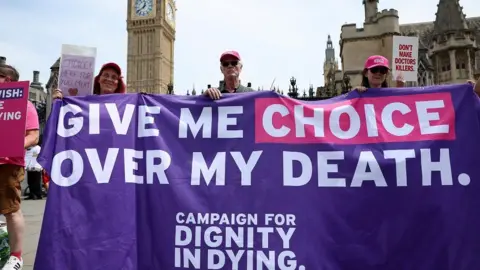Profound social change that is now likely to become law
 Reuters
ReutersTake a step back, and it has been quite a few days.
This has been a week at Westminster that has seen two decisions that point to a profound, socially liberal shift.
Just a few days ago, MPs voted to change abortion legislation to stop women in England and Wales being prosecuted for ending their pregnancy.
And now, the Commons has backed a change in the law in England and Wales to allow assisted dying, or, as some opponents call it, assisted suicide.
This vote doesn't guarantee this will happen - it will head next to the House of Lords - but it is now likely, even highly likely.
It is a colossal social change, compared by many to the Abortion Act of 1967, the abolition of capital punishment, the decriminalisation of homosexuality and the introduction of gay marriage.
MPs had a free vote in both of this week's votes.
But it is also true that the change in the composition of the Commons at the general election - and, in particular, the arrival of hundreds of new Labour MPs - has created the climate and the mood in parliament that has allowed both these votes to pass.
Opinion polls have consistently pointed to significant public support for a change in the law.
A YouGov poll earlier this week suggested over seven in ten Britons supported these assisted dying proposals.
But MPs today were conscious of stepping beyond a discussion of the principles of this idea to scrutiny of the practicalities of this particular bill.
Plenty of opponents told the Commons they believed in a change in the law in principle, but were opposed to this particular bill.
And yet, in the end, MPs have said yes to this change in the law - and so this is a hugely significant, unprecedented moment.
In 2015, the Commons rejected changing the law.
It did so in 1997 too.
Not this time.
The arguments were no less passionate.
Even the terminology is fought over.
While plenty use the shorthand of "assisted dying," for some opponents this is a misnomer.
It should, instead, they argue, be called "assisted suicide" or "assisted killing".
Those arguments will continue, but what will now happen is this bill will head to the House of Lords.
Having been endorsed by the Commons, proponents believe that while peers will scrutinise and likely amend this bill, they are confident it will now become law, in time.

Sign up for our Politics Essential newsletter to keep up with the inner workings of Westminster and beyond.
